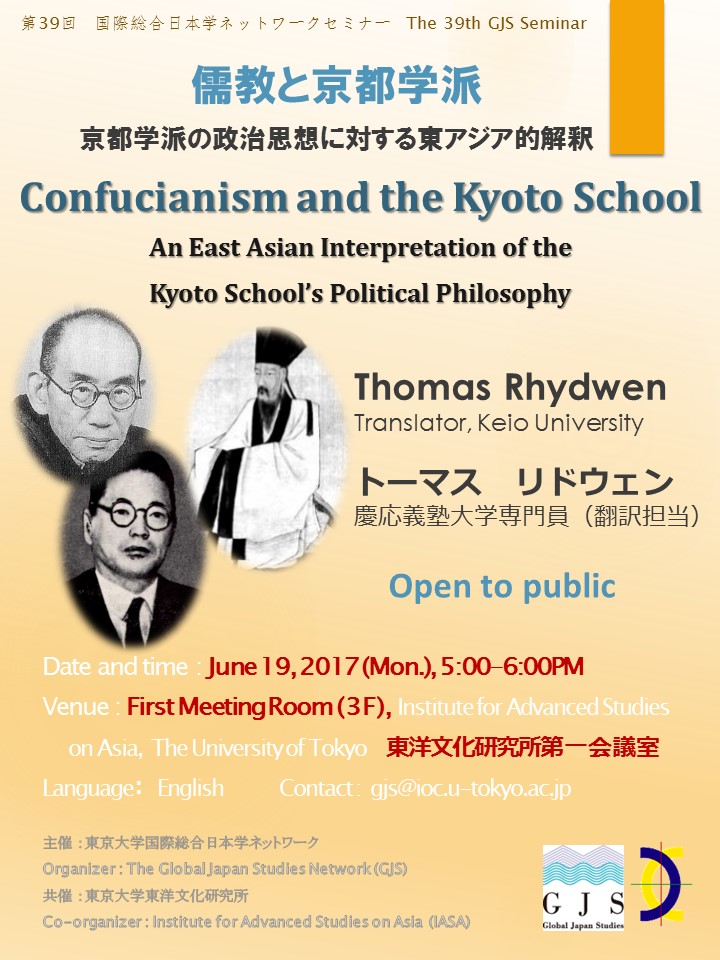News
第39回GJSセミナー「儒教と京都学派--京都学派の政治思想に対する東アジア的解釈」のお知らせ
日時: 2017年6月19日(月)17:00~18:00
会場: 東京大学東洋文化研究所 第一会議室(3階)
発表者: トーマス リドウェン(慶応義塾大学専門員--翻訳担当)
使用言語: 英語
発表概要:
 My doctoral research examines the philosophy of Kōsaka Masaaki from the East Asian perspective of Confucianism, which I believe is the most appropriate moral paradigm for comprehending his political speculations. Although largely neglected in post-war scholarship, Kōsaka was a prominent member of the Kyoto School during the 1930s and 40s. This was a group of Japanese thinkers strongly associated with the philosophy of Nishida Kitarō. Kōsaka is now best known for his participation in the three Chūō Kōron symposia held in 1941 and 1942. These meetings have been routinely denounced by many liberal commentators due to the participants’ support for the Pacific War and the Greater East Asian Co-Prosperity Sphere. David Williams (2014), however, believes that it is not liberalism but Confucianism that reveals the ‘authentic structure of Kyoto School political thought’.
My doctoral research examines the philosophy of Kōsaka Masaaki from the East Asian perspective of Confucianism, which I believe is the most appropriate moral paradigm for comprehending his political speculations. Although largely neglected in post-war scholarship, Kōsaka was a prominent member of the Kyoto School during the 1930s and 40s. This was a group of Japanese thinkers strongly associated with the philosophy of Nishida Kitarō. Kōsaka is now best known for his participation in the three Chūō Kōron symposia held in 1941 and 1942. These meetings have been routinely denounced by many liberal commentators due to the participants’ support for the Pacific War and the Greater East Asian Co-Prosperity Sphere. David Williams (2014), however, believes that it is not liberalism but Confucianism that reveals the ‘authentic structure of Kyoto School political thought’.
Expanding upon the prior research of Graham Parkes (2008) and Michel Dalissier (2009), in this presentation I argue that the relational ontology of Confucianism was incorporated into the Kyoto School’s philosophy from its very inception through the concept of ‘pure experience’. Significantly, An Inquiry into the Good is one of the only texts where Nishida explicitly references Confucian sources. Moreover, Kōsaka himself identifies the philosophy of pure experience as the foundation upon which his mentor developed the later ideas of action-intuition and the logic of place, both of which were hugely influential upon the political thought of the wartime Kyoto School. This study will primarily focus upon a comparison of Nishida’s early thought with the ideas of the Great Learning as based on the interpretation of the Neo-Confucian thinker Wang Yang-Ming, who Christopher Goto-Jones (2005) describes as one of Nishida’s preferred Confucian scholars. This, I believe, presents a suitable framework for reinterpreting the problematic idea of moral energy, a concept that is mentioned by Kōsaka and his colleagues over one hundred times during the Chūō Kōron discussions.
主催:東京大学国際総合日本学ネットワーク(GJS)
共催:東京大学東洋文化研究所(IASA)
問い合わせ:gjs[at]ioc.u-tokyo.ac.jp
登録種別:研究会関連
登録日時:MonMay2909:53:442017
登録者 :gjs事務局・藤岡
掲載期間:20170529 - 20170619
当日期間:20170619 - 20170619

